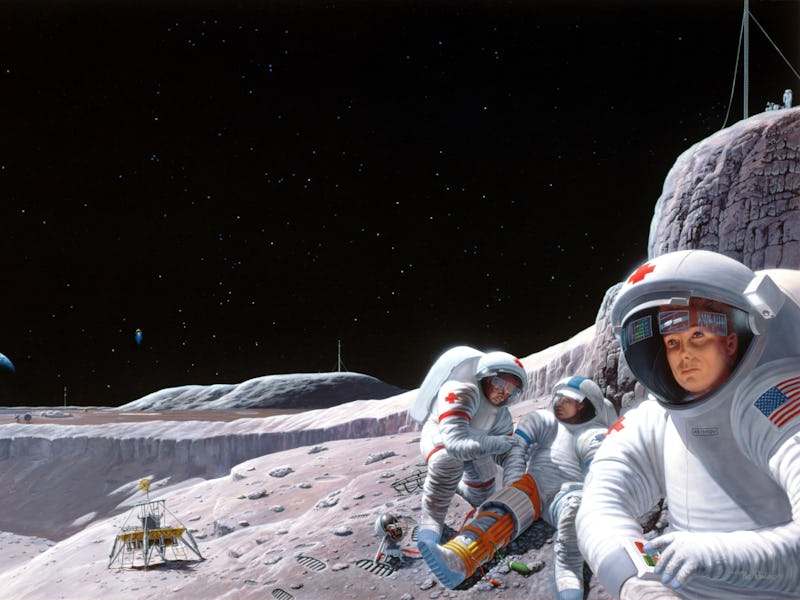A Medical Revolution Is Underway in Orbit
Using genomics and new technologies, NASA is finding the right people and giving them the right tools.

If you get sick here on Earth, there’s a pretty standard set of things you do to get a diagnosis. You can provide some blood, hop in an fMRI, pee in a cup, or get your throat cultured. Then it’s off to the pharmacy with you for that prescription that will accelerate the recovery process or make the symptoms a little more bearable. This is how the modern world does medicine, but the infrastructure that allows for this order of operations is too vast, unwieldy, and expensive to shoot into outer space. So, if humans are to leave Earth, we must first figure out a way to stay alive and healthy in a new environment. We’ve got our smartest people working on it.
Eric Topol, director of the Scripps Translational Science Institute in La Jolla, California, has some thoughts. Topol, a leading expert on emerging trends in healthcare and medicine, sat down with Ellen Stofan, NASA’s chief scientist, at the International Space Station R&D Conference 2016 this week to provide some insight on what astronauts of the future might be doing to diagnose and treat their own medical problems without a physician close by, and how NASA and other space agencies are investigating and advancing these new technologies and techniques.
“It is a really exciting time for medicine,” said Topol. In his view, there is a “technology-driven revolution” currently brewing in the medical community. Wearables and smartphone-assisted tech have become important medical tools. And there are few places better for testing these tools than the International Space Station. “The research we do in the ISS is off the earth, for the earth,” said Stofan.
In her view, NASA stands to benefit from participating in a medical revolution before getting serious about off-world endeavors, which is to say trips to Mars and beyond. She also suggests that NASA has historically taken innovations and pushed them one step further, meaning that cutting edge technologies sent into space might be effectively reconfigured to be even more groundbreaking.
At the talk, Topol busted out a bunch of new technologies he wanted to demo for the audience. The first was a tool that turns an Android smartphone into an ultrasound imager that can “see any organ in the body. Any astronaut could do imagining of themselves — any part of the body.” The probe simply connects to the phone, takes an ultrasound when pressed up against the body, and in seconds you can watch the images flicker on these screen of your device.
The smartphone ultrasound device
In over 30 years as a physician, Topol said he has “never seen anything like this.”
Other devices Topol showed off included a tool that could take cardiograms using a smartphone, and a watch that could measure blood pressure at all moments of the day. “You can do an almost entire self-exam,” he said. “They’re going to have a big impact on how we keep humans healthy.”
Ideally, your smartphone or other system would be able to collect this information and assess your health automatically. In the instance that an algorithm on your phone can’t automatically parse through the data to figure out what’s wrong with you, there’s another breakthrough we can use to treat astronauts millions of miles away: telemedicine. As long as we have easy-to-use tools onboard that can send this data back to Earth, doctors at home could take a look and figure out exactly what the status of the men and women hurting through space is.
Genomics is the other area of medicine that will prove essential for astronauts spending months or years away from Earth. Topol suggested that we may be able to scan the genes of potential astronauts to see “who are more sensitive to [cosmic] radiation…who are more prone to osteoporosis [caused by microgravity environments]. We’ve got to have new ways to find other people who are particularly well suited to this challenge [of space travel].”
Further down the road, technology might become far enough along that we could use implants at a micro or nano scale in order to detect cancer in the blood plasma before conventional diagnostic tools could, or anticipate heart attacks, asthma attacks, or seizures before they occur.
Most important, however, is this: These tools have the real potential to change medicine on this planet. “We have a better chance to make movement through the ISS efforts than we have on the ground here,” said Topol. Up in space, medical trials don’t run up against institutional or regulatory resistance. According to Topol, that spirit of heavily supervised experimentation will allow new technologies to be tested and adopted in orbit, then sent back to Earth to be of use to the terrestrial masses.